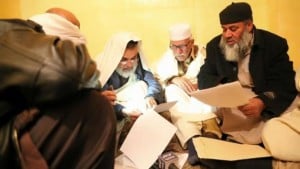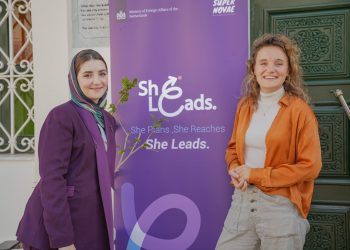By Mohamed Almenfi.

Benghazi, 13 July 2017:
Libya is a tribal society where tribal leaders have been major actors throughout the history of the country. From the Italian colonization of 1911-1945 to the Arab spring in 2011, tribal leaders have played a crucial role in keeping the unity between Libyans and maintaining a relative peace in most of the country.
However, tribes have reinvented their role since the revolution where they are not only solving individual crimes but facing the reality of a civil war within the country. This new role of the tribes has evolved the customary law called ‘Orf in Arabic, which is the common law that is used by tribal leaders to resolve local and national disputes into an established law system. With the three contesting governments failing to provide security and the pockets of violence in the country, ‘Orf , in my opinion, is the only effective law that the vast majority of Libyans respect.
While it is true that tribal grievances and disputes are a contributing factor in the post-2011 conflict in Libya, the efforts of the tribal leaders as peacemakers is, I believe, underestimated. In Libya, it is widely believed that tribes are involved in the conflicts and are the ones who can make peace. Therefore, tribes can play a key role both in peace and conflict. The key lies, in which role we choose to use them.
Hukama (Wise Men), usually tribal sheikhs, I believe have become the most active peacemakers in Libya. While politicians are considered too busy fighting over power, Hukama are engaged in the process of peacebuilding to conflict prevention by using ‘Orf. Their importance emerged prominently after the collapse of state security and stability in 2014. Therefore, capitalizing on the effective role that Hukama are playing is, I believe, the most pragmatic solution for containing most of the conflicts in Libya now.
Before the Libyan revolution which toppled Libya dictator Muammar Qaddafi in 2011, ‘Orf was one of the sources used in Libyan criminal cases. The state relied on Sheikhs to solve small-scale crimes. According to Abubakar Almenfi (Tribal sheikh in Tobruk city in the east of Libya), a Libyan judge can free the perpetrator, in a killing crime, if the two tribes, the victim and perpetrator families, resolve the conflict using ‘Orf.
Although many would believe this is an overstepping of the law, Libyans saw ‘Orf, especially in the areas far from the central government, as a vital component in restoring relationships and enhancing the social cohesion within the community. Najla Mangoush (Libyan PhD candidate in peacebuilding) says, in an interview with Peacemakers Network, “The power of the tribal leaders is how they can restore the relationship between two sides that have been affected by the conflict”.
Post the 2011 revolution, the traditional peacemakers were forced to evolve their engagement from solving small conflicts to dealing with national ones. As the absence of law grew and with the gradual deterioration of the state security, the ‘Orf authority gained more respect, and Hukama became almost the most active peacemakers in the country. The concept of ‘Orf is considered by many Libyans to be the only thing that is still holding Libya together and providing a relative stability in some parts of the country.
According to the USIP report in 2016 “Tribe, Security, Justice and Peace in Libya Today”, 979 Libyans were interviewed and over 60 percent of respondents agreed that tribes were able to “provide security” to the community. Despite the fact that Qaddafi’s weapons are easily available on the streets with no government control, ‘Orf has succeeded relatively in keeping the social fabric together in some places. Maree Albarsha, a Sheikh from the Magarba tribe, said: “If thousands of Libyan lives have been lost in the current civil war in Libya, ‘Orf has saved hundreds of thousands”.
Historically Libya consists of three provinces; Tripolitania (west), Cyrenaica (east) and Fezzan (south). Cultures and customs vary from region to region. As a result, the roots and causes of conflict in each area differ significantly. Nonetheless, they share in their respect for ‘Orf, and Hukama still can have an influence among the public in the three provinces.
Tribal Peace Efforts in West Libya
The prolonging of the liberation war against Qaddafi’s regime triggered a national division splitting the cities in west Libya into two camps; pro-Qaddafi and anti-Qaddafi. Although some people think that the root of the conflict in the West was the dispute over fighting Qaddafi, many others assume that the war against Qaddafi was a pretext to revenge for old communal disputes, such as conflicts over lands or historical conflicts since the Ottoman and Italian eras.
In the Nafusa Mountains, in the north-west of Libya, for instance, Zentan and Meshashya tribes have been involved in a violent conflict since the spark of the Libyan revolution. Zentan accused Meshashya of helping Qaddafi’s army in bombarding Zentan. Whereas, Meshashya believed that Zintan wanted to take control of several disputed lands and used the war against Qaddafi as an excuse. Since October 2011, more than 2500 people from Meshashya fled three villages near Zentan. Even though Zentan did not forcibly displace them, there was a direct threat to their lives if they retuned.
With the security vacuum and intensity of the political scene in Libya since 2011, the consecutive governments were not successful in mediating a peace deal between the two tribes. So, a coalition of twelve tribes from all over Libya stepped in and managed to make an inter-tribal reconciliation deal – something the three currently competing governments were not able to do. This peace accord, signed on May 18th, 2017 in Al-Asaba city, paved the way for the shops, schools and hospitals to reopen and ultimately the return of all internally displaced people from the three Meshashya inhabited villages: Awiniya, Zawyt Albagol, and Umar.
This coalition negotiated the peace accord tirelessly for more than a year, according to Mohamed Abo Kasem, a member of the reconciliation committee from Meshashya. “This alliance reflects the tribal leader’s ability to stop and prevent further conflicts and act as peacemakers in the absence of state authority,” Abo Kasem added.
Tribal Peace Efforts in the East
Contrary to the west of Libya, the East (Known as Cyrenaica) was liberated from the Qaddafi regime in almost a week. As a result, the division stemming from the war against Qaddafi did not infiltrate communities in this region. Similar to the rest of Libya, however, the absence of law is increasing. The assassination of army and police officers started to ramp up in 2013. That led to the war between the Libyan National Armey (LNA), and 17th of February revolutionaries and Ansar al-Sharia (on the UN Al Qaeda sanctions list), in Benghazi. With the war tearing the eastern region, the deactivation of the justice system, and absence of the rule of law, tribal sheikhs decided to act.
Majdi Boshiha, a Shiek from Twajeer Tribe based in Benghazi, said: “We cannot wait for the government or the army to provide security; we need to act and do it fast”. Based on this sentiment from tribal leaders and their understanding of their national responsibility, all Cyrenaica tribes gathered on April 15th, 2017 in Asahel city, 300 Km east of Benghazi, to codify and endorse the ‘Orf temporarily.
They called it the Cyrenaica Honor Code, which acts as guidelines to solving conflicts and sustaining peace by providing steps to be taken in case of any crime or violent act. This was the first time that the ‘Orf was officially written. “Tribes cannot be a political party, lawmaker, or get involved in politics, but we cannot sit by and watch people die every day and do nothing”, said Maree Albarsha. He added, “This Honor Code is meant to fill the security vacuum, prevent revenge, avert violence and preserve the sense of security that most Libyans are missing.”
This tribal initiative is what is holding the eastern region of Libya together in the current war, as no city or tribe is currently attacking one another. It is a culmination of tribal efforts to prevent the war in Benghazi flaring into another cycle of violence in the region. However, the lack of participation of youth and women in the tribal efforts has made many people skeptical of the tribal peace process. Youth and women are the most affected by the current Libyan crisis and any peace deal has to consider and involve these two parts of the society. Therefore, the tribal elders have to communicate more with the youth and women in order to improve their role in ending local conflicts.
Perspective for Any Future Peace Initiative
The Libyan tribal sheikhs have a track record in acting to prevent violence, peacekeeping, and saving many lives in Libya among the current chaos. As a result, not respecting and utilizing the tribal traditional way of bringing people together, can indicate a lack of understanding of how Libyan society functions. Hence, if any entity, whether it is the Libyan authorities, the UN or other national governments, needs a strategy to end the conflict, this strategy should put the following into consideration:
The successful tribal efforts of peacemaking show that tribal sheikhs, with time and support, can be effective in ceasing violence at the local level. Therefore, there should be support to such interventions and invest in partnership with the local leaders. They could, for example, create a peacebuilding office in each municipality, consisting of Hukama, to help the local police in containing any conflicts. While it is true that this idea is implemented in some places, it doesn’t receive enough support.
The Cyrenaica Honor Code success in sustaining peace between tribes in the East can be a Libyan model for all unstable regions in Libya and used nationwide. The relative stability of communities in the east of Libya underscores the effectiveness of the ‘Orf, due to the high respect for it among Libyans. We can take advantage of the ‘Orf respect to build sustainable peace as a second step after averting violence until national reconciliation can be achieved and a federal government reestablished.
Finally, peace needs economic development to be sustained, and political reconciliation is essential for this development and investment. Many Libyans believe that economic well-being can draw people away from their disputes. Therefore, and parallel to tribal leaders’ efforts, the Libyan authorities and the international community have to maximize their efforts in bringing the political factions together and improving the governance of national resource revenue to ensure the turning of the economic wheel.
Mohamed Almenfi is from Benghazi and has been a part of multiple civil society projects and initiatives since the Libyan 2011 revolution1. These ranged from humanitarian assistance, peace constitution building projects, and local governance initiatives. His most recent focus is on strengthening the role of non-state actors – particularly civil society organisations – in post-conflict stability, as well as preventing youth radicalization and building a sustainable peace by using sports activities through the ‘‘Rugby 2018 Project’’.
The views in this opinion piece do not necessarily reflect those of the Libya Herald.








